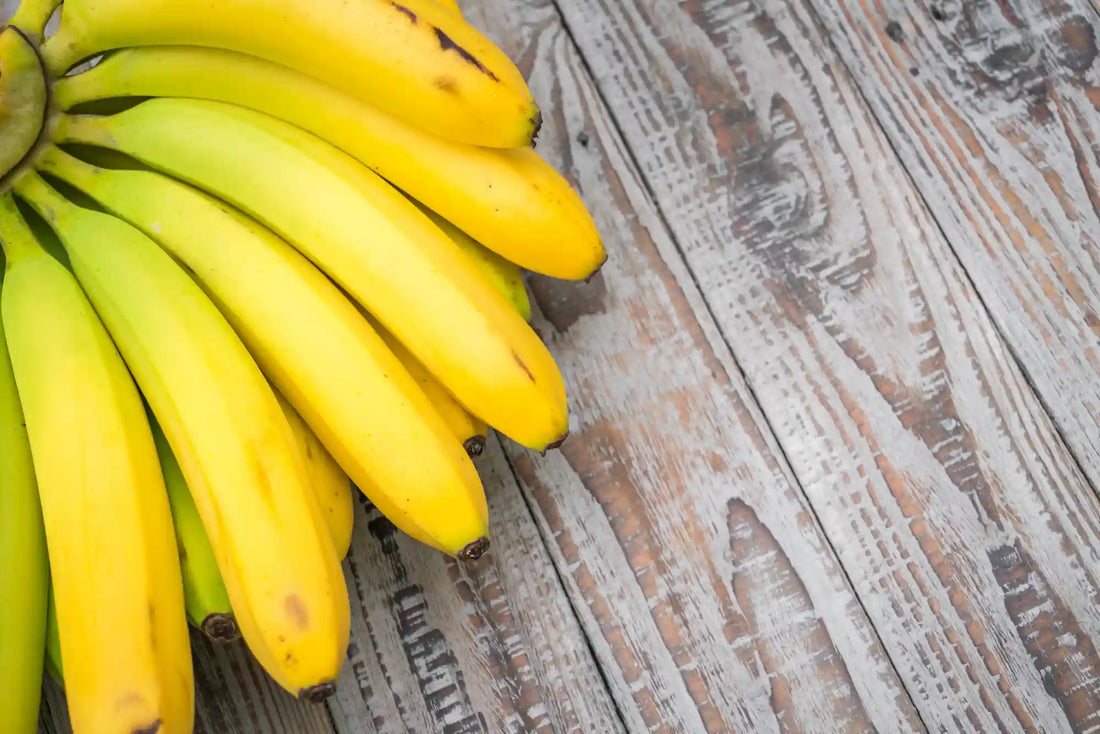
Understanding the Link Between Dehydration and Potassium
Share
Ever wondered why a busy day leaves you feeling drained and out of sorts as if your body is missing something essential? What if you could pinpoint that missing element and replace it effortlessly, regaining your energy and focus?
The answer may lie in understanding the relationship between dehydration and potassium—a crucial balance that most of us overlook but is vital for optimal health.
Essential Takeaways:
- Even mild dehydration can disrupt the delicate balance of potassium in your body, leading to a range of symptoms from muscle cramps to irregular heart rhythms.
- Looking to simplify the process of maintaining hydration and potassium balance? Energy Drops offer an ideal solution. Infused with a blend of essential electrolytes and energizing nutrients, just a light squeeze can transform your everyday beverage into a comprehensive hydration and energy-boosting formula.
Dive into this blog to learn why this balance matters and how you can easily maintain it.
- Introduction: The Dehydration-Potassium Connection
- The Importance of Potassium in the Body
- Potassium's Role in Hydration
- Dehydration's Impact on Potassium Levels
- Can Dehydration Cause Low Potassium?
- Symptoms of Potassium Imbalance Due to Dehydration
- Balancing Hydration and Potassium Intake
- Does Drinking Water Lower Potassium?
- The Role of Hydration Drinks with Potassium
- Special Considerations: Athletes and Potassium Intake
- Medical Conditions and Potassium Management
- What Depletes Potassium in the Body?
- Conclusion: Nurturing Balance for Optimal Health
Introduction: The Dehydration-Potassium Connection
Potassium plays a crucial role in maintaining electrolyte balance in the body, which is vital for regulating heart rate, muscle function, and even digestion (1). Dehydration can significantly disrupt this balance, leading to a range of health issues—from muscle cramps to irregular heart rhythms (2).
In this blog, we'll delve into the intricate relationship between dehydration and potassium, shedding light on how they impact each other and what you can do to maintain balance.
The Importance of Potassium in the Body
Potassium is an essential mineral that serves multiple functions, such as regulating fluid balance, aiding muscle contractions, transmitting nerve impulses, and maintaining a regular heart rhythm.
The mineral exists in a delicate balance with sodium and other electrolytes, facilitating essential biochemical processes (1). Therefore, understanding how dehydration affects potassium levels sets the foundation for better health management.
Potassium's Role in Hydration
Potassium works in harmony with sodium to maintain cellular fluid balance. While sodium typically encourages fluid to exit cells, potassium serves as a counterbalance by pulling fluid in (3).
This balance prevents excessive water loss, thereby protecting the body against dehydration. When this balance is disrupted, the body's hydration status is compromised, which can lead to numerous health issues (3).
Dehydration's Impact on Potassium Levels
When the body is dehydrated due to factors like inadequate water intake, excessive sweating, or illness, potassium levels in the blood can become concentrated (4).
Elevated potassium levels (known as hyperkalemia) can lead to dangerous heart rhythms and muscle weakness (4). Dehydration can also lower potassium levels, leading to hypokalemia, a condition with its own set of complications (5).
Can Dehydration Cause Low Potassium?
While dehydration is often associated with high potassium levels due to blood concentration, the opposite can also happen. When your body loses fluids - through excessive sweating, vomiting, diarrhoea, or overuse of diuretics - it may also lose potassium along the way.
This loss can lead to hypokalemia, a condition marked by abnormally low potassium in the bloodstream. It’s more common than people think, especially if you're dealing with frequent fluid loss or not replenishing electrolytes after physical activity or illness.
If you’re constantly dehydrated and experiencing symptoms like fatigue, cramping, or irregular heartbeat, it could be a sign that both your hydration and potassium levels are off.
Symptoms of Potassium Imbalance Due to Dehydration
Potassium imbalances can manifest in various ways, including:
-
Muscle Cramps: The absence of potassium can cause painful muscle cramps, especially in the legs.
-
Weakness: A feeling of fatigue or weakness throughout the body can indicate low potassium levels.
- Irregular Heartbeats: Both high and low levels of potassium can lead to heart arrhythmia (1).
In severe cases, potassium imbalances can even lead to extreme muscle breakdown. Recognizing these signs early on is crucial for prompt intervention, as severe potassium imbalance can be life-threatening (1).
To learn more about how potassium plays a key role in preventing muscle cramps, check out our blog on Potassium and Muscle Cramps: What You Need to Know.
Balancing Hydration and Potassium Intake
Maintaining a balance between hydration and potassium is essential for optimal health. Consuming adequate amounts of water and incorporating potassium-rich foods like bananas, spinach, and sweet potatoes into your diet can help prevent imbalances (6). The goal is to ensure that your electrolytes are in equilibrium.
For more tips on how to hydrate effectively, don't miss our blog on How to Hydrate Quickly and Effectively.
Does Drinking Water Lower Potassium?
Drinking water itself doesn’t directly lower potassium levels, but excess water without electrolyte intake can dilute potassium concentrations, especially during periods of prolonged hydration without food or supplementation.
Think of it like this: when you overhydrate without replenishing minerals, you're flushing out electrolytes - including potassium - without topping them back up. That’s why pairing fluids with trace minerals or potassium-rich hydration support (like Buoy Drops) can make all the difference.
The Role of Hydration Drinks with Potassium
Hydration drinks enriched with potassium can offer a convenient and effective way to replenish fluids and electrolytes lost through sweat, illness, or inadequate fluid intake. Here are some of the numerous benefits of adding a high-quality hydration drink to your daily routine:
-
Quick Replenishment: These drinks offer rapid replacement of lost fluids and electrolytes.
-
Convenience: Simply add to your water bottle or any beverage of your choice.
-
Effective: Buoy Hydration Drops not only hydrate but also restore electrolyte balance, including potassium.
- Versatile: Suitable for everyday use or during physical activity.
With these benefits, Buoy Hydration Drops make a compelling case as a go-to choice for anyone looking to maintain optimal hydration and electrolyte balance.
Special Considerations: Athletes and Potassium Intake
Athletes and those engaged in intense physical activities have unique potassium needs. Sweating heavily during exercise can deplete potassium levels, necessitating a different strategy for electrolyte management. It's advisable to consume electrolyte-rich fluids before, during, and after rigorous activities to maintain balance (7).
Medical Conditions and Potassium Management
Certain medical conditions, such as kidney diseases and diuretic use, can dramatically affect potassium and hydration levels (8). In such cases, monitoring and managing potassium intake becomes even more crucial. Consult your healthcare provider for advice tailored to your individual needs.
What Depletes Potassium in the Body?
Potassium depletion can happen gradually or all at once. Some of the most common causes include:
-
Diuretics (used for blood pressure or heart conditions)
-
Sweating (during intense workouts or hot weather)
-
Vomiting or diarrhoea
-
Magnesium deficiency (can impact how potassium is absorbed)
-
Poor dietary intake
-
Chronic stress or overtraining
It’s not just about how much potassium you eat - it’s about how much your body holds on to. That’s why hydration plays a key role. Without enough fluid, even potassium-rich foods might not be absorbed properly.
Conclusion: Nurturing Balance for Optimal Health
Understanding the connection between dehydration and potassium is vital for achieving optimal health. Ensuring you're well-hydrated and incorporating potassium-rich foods into your diet are foundational steps everyone should consider.
The Convenience and Effectiveness of Buoy Hydration Drops
But let's be honest—life is busy, and sometimes it's challenging to maintain this balance consistently. That's where Buoy Hydration Drops can make a difference. Specially formulated to provide a balanced blend of electrolytes, these drops are a convenient and effective way to help you stay hydrated and keep your potassium levels in check.
Transforming Ordinary Water into a Powerful Hydration Solution
Just a few drops in your water bottle can transform ordinary water into a powerful hydration solution, helping you maintain that crucial electrolyte balance.
So why not give Buoy Hydration Drops a try? Your body will thank you for it.
Stay hydrated, stay balanced, and pave the way for a healthier you.

Frequently Asked Questions
Can dehydration cause low potassium?
Yes. While dehydration can concentrate potassium in the blood, it can also lead to potassium loss - especially through sweating, vomiting, or diuretic use.
How do I know if I have a potassium imbalance?
Common symptoms include muscle weakness, cramps, irregular heartbeat, fatigue, and in some cases, tingling or numbness. A blood test is the most accurate way to check your levels.
What’s the fastest way to restore potassium?
Eating potassium-rich foods (like bananas, sweet potatoes, spinach) is a great start, but pairing hydration with trace minerals - like those in Buoy Drops - can help you replenish faster and more consistently.
Can I get too much potassium from hydration drinks?
Unlikely if you're using a balanced product without concentrated doses. Buoy Drops are formulated for regular, safe use without overloading any one electrolyte.
What’s the relationship between potassium and hydration?
Potassium helps regulate fluid balance inside your cells, supporting hydration from the inside out. Without it, your body can't retain water efficiently - even if you're drinking plenty.
References:
- Taylor, K., Jones, E. B. (Updated 2022, October 3). Adult Dehydration. In: StatPearls (Internet). Treasure Island (FL): StatPearls Publishing. Retrieved from https://www.ncbi.nlm.nih.gov/books/NBK555956/
- Healthline. (2019). Electrolytes: Functions, Imbalance, and Sources. Retrieved from https://www.healthline.com/nutrition/electrolytes
- Simon LV, Hashmi M.F., Farrell M.W. (Updated 2023). Hyperkalemia. In: StatPearls [Internet]. Treasure Island (FL): StatPearls Publishing; 2023 Jan. Retrieved from https://www.ncbi.nlm.nih.gov/books/NBK470284/
- Healthline. (2018). Symptoms of Low Potassium (Hypokalemia). Retrieved from https://www.healthline.com/nutrition/potassium-deficiency-symptoms
- WebMD. (2023). Potassium-Rich Foods. Retrieved from https://www.webmd.com/diet/foods-rich-in-potassium
- Canadian Academy of Sports Nutrition (n.d.). Potassium. Retrieved from https://caasn.com/potassium.html
- Healthline. (2022). Potassium. Retrieved from https://www.healthline.com/health/potassium







